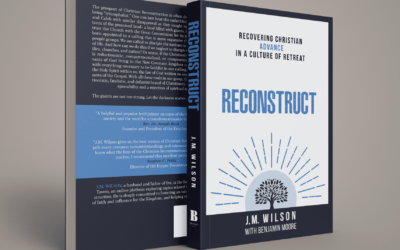Every now and again an article will pop up on some mainstream media company’s website which makes for some interesting reading (even if the proposed solution to whatever problem is almost always wrong). On August 1st, just such an article rose to the surface within certain circles of the internet and came to my attention. The article, written by an MSNBC political columnist and editor by the name of Zeeshan Aleem, is titled “Why America needs a new kind of atheism right now” and can be found on MSNBC’s opinion page.
In an act of kindness to his readers, Mr. Aleem succinctly lays his thesis out in the subtext of the article itself:
“An energetic atheism can tackle the twin crises of creeping theocracy and the death of conventional religion.”
Allow me to briefly summarize the content of his article before offering my thoughts on his so-called crises, answering the two major objections to religious faith he touches on, and then analyzing whether his solution actually solves anything.
The problem summarized
The author walks us through how he believes “the first crisis is rooted in an excess of religion” by referencing (among other things), the overturning of Roe, the allowance of prayer in schools, the invocation of Christianity by Republican legislators, and the rise of Christian Nationalism. All evidence, he asserts, of an alarming push for Christian theocracy.
Almost paradoxically, Mr. Aleem states that “the second crisis is tied, ironically, to the decline of religion.” Citing pewresearch studies and religionnews.com articles, he makes the case for organized religion in America hemorrhaging adherents, which is leading an increasingly growing number of those interviewed to identify as “nothing in particular”. This move away from organized religion, from identifying as a particular religious faith, is leading to a decline in participation in civil society at large, which is opening the door for the more vocal and active Christian Nationalist types, according to the author.
If you view the world through the same gray colored lenses as Mr. Aleem, you may be left asking, “What is the solution to these vexing problems? From whence cometh our aid?”
Fret no further, dear reader! Communitarian Atheism™ has come to fix what ails you. According to Mr. Aleem, communitarian atheism “would provide an effective way to guard against the twin crises” of religious extremism on the one hand and increasing atomization on the other. By organizing into a community of unbelief, modern skeptics can become well placed and influential enough in politics and thus ward off “The Handmaid’s Tale” a bit longer, while simultaneously addressing the “social and spiritual vacuum” that is taking place as participation in organized religion dwindles.
We are then treated to the author detailing his journey from growing up Muslim to becoming an atheist, and shortly thereafter to becoming a leftist activist (his choice of label, not mine!). He explains how, among a few other interactions, two specific arguments crumpled his faith and pushed him to the cold embrace of atheism: Philip Kitcher’s “argument from symmetry” and the problem of evil.
Did I say atheism was cold? According to Mr. Aleem, that is not the experience he has had. He has been freed to “think about achieving utopia on earth” and become politically active. However, political groups “didn’t seek the exact kind of togetherness and quiet search for purpose I was craving” because we should all be on a quest for “truth and morality”. He even gushes about his experience attending a local Quaker meeting where he was able to experience community and thus feel at home.
“Communitarian atheism” he asserts, “is the best of all worlds.”
The last part of the article consists of the author acknowledging that he sees atheism as a “big tent” and simply means a “lack of belief in them [gods] for evidential and sometimes logical reasons.” He goes on to bemoan the organized activism of the far right, how the secular, liberal left has no cohesion in order to combat the religious right’s advances, and their lack of long term vision.
Some of his final remarks come from his ideological hero, Professor Kitcher, who says “Religion can be an inspiration, but it can’t be an authority,” and that religious texts must always be “subject to moral deliberation and moral argument.” He concludes his article with a few pleas to the secular community, suggesting they form secular meditation groups or some other community based activity in order to have a place to welcome the growing number of people leaving religion. It is there, he contends, that they will not only be able to combat the religious right, but they will have a space where they can “contemplate important questions, form community, and think about how to collectively better the only world we can be sure we have.”
Now that we have rummaged through the breadth of Mr. Aleem’s article, let us plumb the depths to determine how deep communitarian atheism goes.
Cause for concern?
The first so-called crisis that Mr. Aleem highlights is the rise of Christian Nationalism. Besides being the buzzword of the hour, just what is Christian Nationalism? According to this nifty handout from christiansagainstchristiannationalism.com, Christian Nationalism “is a cultural framework that idealizes and advocates a fusion of Christianity with American civic life. Christian nationalism contends that America has been and should always be distinctly ‘Christian’ from top to bottom”. In other words, Christians who believe their faith should influence their interactions in the public square, who think that society would best be governed by God’s infallible, inerrant word, are Christian nationalists. Put another way, Christians who believe the Bible is sufficient for all of life and take this idea seriously are Christian nationalists. By this understanding, Christians who hold historic, orthodox beliefs are Christian nationalists.
How positively terrifying! Christians who take their faith seriously; who believe that Christ is the conquering King of kings who will make all His enemies His footstool; who believe that God wants us to disciple the nations and see them come to Christ; who think that God’s word has something to say about society’s laws and political governance; these Christians are a dangerous threat to society according to men like Zeeshan Aleem.
What about the dwindling numbers of adherents to organized religions throughout the United States? Is this something that should concern Christians? Is this a sign that somehow atheism will overtake the Church? To borrow a phrase: by no means! While there is no doubt that theologically liberal denominations are dying off, and even some conservative denominations are taking a hit in attendance, this is not a cause for concern.
It should come as no surprise that a growing number of people would rather stay at home instead of go to church in light of the harsh covid crackdown measures many States in our nation enacted over the past few years. Even in States that were lenient, many churches chose to remain closed to in-person gatherings, often citing prudence as a cover for their jelly filled backbones. People naturally do not want to do things that are hard, or that would make them look bad, or that would require a genuine sacrifice on their part.
Aaron Renn makes the case that Christianity has fallen out of society’s favor, that we are living in what he has termed “Negative world” in his excellent article “The Three Worlds of Evangelicalism” over at First Things. I commend the article to you, and would use that concept as the framework to support the idea that Christianity (and even organized religion in general) is continually trending negatively in the eyes of the citizenry of the United States.
To faithful Christians who seek to apply God’s word to all areas of their life, these two “crises” are laughable. What about the challenges to Christianity Mr. Aleem brings up in his article, namely the “argument from symmetry” and the problem of evil?
A question of faith
Professor Philip Kitcher’s argument from symmetry is the idea that because there are a lot of different religions in the world, many with vastly conflicting accounts and claims, that the possibility of any religion being correct is nearly non-existent. Put simply, “With so many different religions in the world, how can yours be true?” Not to put too fine a point on it, but this is such a silly claim that it is hard to believe that this could persuade anyone, let alone make it into an academic paper by a philosophy professor at Columbia.
Just because people groups from around the world have different accounts for creation or varying beliefs about the supernatural does not in any way invalidate Christianity. Scripture is replete with examples of pagan cultures worshiping all manner of false gods despite teaching that there is only One True God. The amount of fraudulent currency in existence does not nullify the genuine artifact. Observing that there are many religions is not a value judgment or argument on whether one is correct or not. It is simply an observation.
What about the problem of evil? This timeless chestnut has been addressed countless times. From Augustine’s “City of God” to Anselm’s “The Fall of the Devil”, from Aquinas’ “Summa Theologica” to Luther’s “Bondage of the Will”, Christians have wrestled with (and answered) this objection too many times to count. It seems to me that if a person is going to lay the claim that evil is a problem at the foot of Christianity, they should at least have the common decency to research what some of the most prominent and influential Christian thinkers have said about it down through the ages. Instead what we are often left with is the skeptic acting as if they have stumbled upon a treasure in a field that no one before them has discovered; a treasure so weighty they must sell their religious convictions so they can purchase the field in which it lay. They then use this “newfound” treasure as a means to fund their campaign against religious thought.
What of Mr. Aleem’s supposed solution? How should we approach communitarian atheism?
Communitarianism cross examined
Communitarian atheism is nothing new. It is the same empty, ramshackle house of salvation by society, only this time it has fresh drapes in the windows. It is a twisting of the Christian doctrine of salvation through the One (Christ) into the salvation through the many. What I mean when I say salvation by society is this: his proposal is that the best life one can live, indeed the best of all worlds as he puts it, can be found in gathering with like minded folk. It is only by gathering with like minded (secular) folk can the world be bettered and we can move a few inches closer to the ever elusive utopia.
Communitarianism seeks to supplant Christ as the one who dissolves the dividing wall of hostility by uniting everyone under a common banner – one of unbelief. Instead of being united in subjection to Christ, communitarianism would have us be united in rebellion to Him.
This idea, that salvation can be had once we have the right society, or at least the right group of people in the right spot, is almost as old as time itself. Christian doctrine is clear on this; there can be no utopia here on Earth so long as those who inhabit the Earth are unregenerate. Despite God’s promise to continue to crush His enemies under His feet, there will always be those who reject God and choose their sin (at least until the Last Day). Salvation by society, or salvation by politics, is the same old sham it has always been.
The crux of the matter, the real meat and potatoes that Mr. Aleem and his communitarian comrades will have to wrestle with, is “So what?” If their worldview is correct, if indeed God does not exist, then what does it matter whether we achieve a utopia here on this Earth? Aren’t we all just highly evolved primates that are self aware and destined for destruction via heat death? What does it matter if one group of evolved primates thinks we shouldn’t kill babies while another group kills them (or even eats them)? Did our brains not simply evolve to think that way?
Further, if their worldview is correct and Christianity is false, then there can be no such thing as objective truth, objective morality, or laws of logic. This makes the claim by professor Kitcher all the more ridiculous! By what standard of morality and truth should the Bible be scrutinized? By his standard? By mine? By his communitarian crew? All of these are woefully subjective, and thus unfit for such an endeavor. Whose laws of logic should we examine the Scriptures with? Abstract universals such as logic cannot be accounted for according to his worldview, so to say we all evolved to agree on conventions like “the law of non-contradiction” is laughable.
A new Christianity for a new America
Mr. Aleem is right about one thing; our nation is changing in alarming ways. In the globalistic “post covid era” in which we live, it has become apparent that what is needed now more than ever is a new Christianity. One with a spine. A Christianity with a backbone not found in many churches today. A Christianity that is robust and capable of not only addressing all the issues of this world through the lens of God’s Word, but one that can stand firm in the face of government thugs seeking to place us in the bonds of tyranny. One that can stand firm despite living in the “negative world”.
If you have been paying attention and have been connecting the dots along with me, you will realize this “new” Christianity that I am proposing is not really new at all. Rather, it is an old faith, one that burst upon the world’s scene with a boldness that saw many faithful slaughtered. It is a resilient faith; a faith that doesn’t shy away from the hard passages in Scripture; that makes disciples of its children and neighbors; that eschews hypocrisy and seeks to recapture true piety; that makes households joyful and productive; that pushes back against the encroaching darkness with laughter, knowing that the God we serve has conquered the darkness; that takes every thought captive to Christ and seeks to live before the face of God.





0 Comments